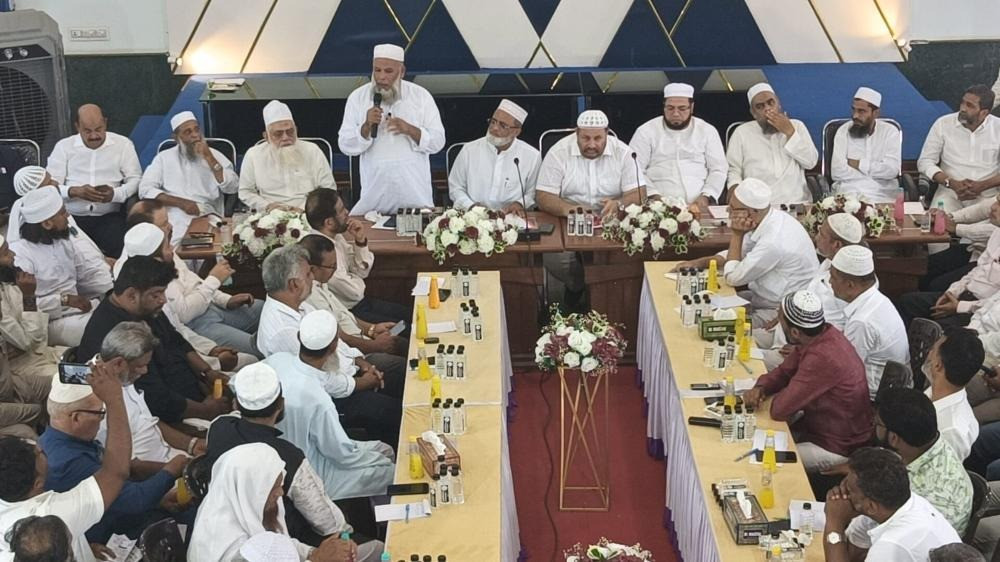Bhatkal, April 15: Leaders and representatives from Muslim organizations across Karnataka’s coastal districts and parts of Goa gathered at Rabita Hall in Bhatkal on Tuesday to express collective opposition to the Waqf (Amendment) Act passed by the central government. The meeting was organized by Majlis-e-Islah wa Tanzeem, a prominent community organization in Bhatkal, and brought together voices from Uttara Kannada, Udupi, Dakshina Kannada, and neighbouring regions.
Participants at the convention described the new law as a direct attack on the autonomy of Waqf institutions and accused the government of interfering in Muslim religious matters. They warned that the changes could weaken the management of properties meant for community welfare and religious purposes.
A resolution adopted at the meeting called for protest demonstrations to be held on Friday, April 18, across Uttara Kannada district after Friday prayers. Protesters will hand over memorandums addressed to the President and Prime Minister through local authorities. Community leaders also announced that an awareness campaign would be launched to educate people on how the new amendments could impact Waqf properties and institutions.
Speakers at the meeting emphasized the importance of unity within the community and urged collaboration with secular-minded individuals from other faiths, noting the success of past movements such as the anti-CAA protests.
Advocate M.K. Maitri, a senior lawyer from Bengaluru, presented an overview of the legal implications of the Waqf amendment, cautioning that it could give the government more control over Waqf institutions. Maulana Ilyas Jakati Nadvi, a member of the All India Muslim Personal Law Board (AIMPLB), opened the session by explaining the Board’s stance and ongoing national campaign against the law.
The event was chaired by Inayatullah Shabandri, President of Majlis-e-Islah wa Tanzeem. Several notable community leaders were present, including Atiqur Rahman Muniri of Rabita Society, Abdul Raqeeb MJ Nadvi of Tanzeem, and political figures like Ashraf Beary and former MLA Mohiuddin Bava. Delegates from Mangaluru, Udupi, Karwar, Sirsi, Murdeshwar, Honnavar, and Goa were also in attendance.
The gathering appreciated Tanzeem’s efforts to bring leaders together and proposed setting up a regional coordination body to continue raising concerns over the Waqf law and other issues affecting the Muslim community.
The speakers reiterated that the protests would be peaceful and lawful and urged community members to participate in large numbers to ensure their voices are heard.

Let the Truth be known. If you read VB and like VB, please be a VB Supporter and Help us deliver the Truth to one and all.
Hyderabad (PTI): The DGGI, Hyderabad zonal unit, on Thursday said it has identified an alleged organised syndicate worth Rs 13,000 crore involved in operating "illegal" online gaming websites in the country with the assistance of associated fintech companies and arrested one of the masterminds.
It further said it has launched a massive crackdown on online gaming syndicates, including action against associated fintech companies, freezing bank accounts to the tune of Rs 100 crore and has begun arresting the masterminds.
As part of the online gaming investigation, GST Intelligence, Hyderabad arrested Pankaj Kumar, founder and director of Adsum Advisory Service Pvt Ltd, the city-based firm, which provides services for fraud detection and customer verification/digital KYC verification, a release from the Directorate General of GST Intelligence (DGGI), Hyderabad zonal unit said.
"Evidence gathered during the investigation pointed to the identification of an organised syndicate worth Rs 13,000 crore involved in operating illegal online gaming websites with assistance of associated fintech companies, including payment aggregator, payment gateway and third-party technology service providers, wherein Pankaj Kumar is one of the masterminds responsible for fraudulent KYC verification of merchants and shell entities on behalf of RBI regulated entities like Payment Gateways and Banking as Payment Aggregator (BAPA)," it said.
Being director of a company responsible for KYC verification process, Kumar "failed" to develop risk profiling of customers based on ownership and control structure and helped in onboarding of shell entities for UPI integration required for flow of money from online gaming, it alleged.
The DGGI, Hyderabad unit, further alleged Kumar, is one of the beneficiaries who received "illegitimate" proceeds of crime generated by the online gaming syndicate.
Further investigation is under progress, the release added.





